As the UK pursues its ‘Jet Zero’ target of net zero emissions from its aviation sector by 2050, a raft of new initiatives by government and industry have taken place over the past week. To coincide with the Sustainable Skies event held at Farnborough on April 17, the eighth meeting of the Jet Zero Council, which is made up of government, industry and academic representatives, revealed an action plan for the next two years covering zero emission aircraft development and sustainable aviation fuel production. The event also saw a fly-past by an RAF Airbus A330 partly powered by SAF that had undertaken a training air-to-air refuelling exercise over the North Sea. The government also published an independent report on developing a UK SAF industry, and UK industry group Sustainable Aviation unveiled an updated version of its Net Zero Carbon Road-Map. Meanwhile, LanzaTech has revealed plans by its UK subsidiary for Wales’ first SAF production plant and low-cost airline Wizz Air has announced an investment in UK sewage-to-SAF company Firefly.
The Jet Zero Council, which is jointly chaired by the government’s Transport Secretary and Energy Security and Net Zero Secretary, adopted its two-year plan with actions to speed up the design, manufacture and rollout of zero emission aircraft and the required infrastructure at UK airports. It also sets out how the Council will help to accelerate SAF production through investment in first-of-a-kind SAF plants, supporting scientific research on a larger scale and help to drive down production costs. The Council meeting also agreed to set up a group to advance knowledge and mitigation options on the non-CO2 impacts of aviation.
“This government is a determined partner to the aviation industry – helping accelerate new technology and fuels, modernise their operations and work internationally to remove barriers to progress,” commented Transport Secretary Mark Harper. “Together, we can set aviation up for success, continue harnessing its huge social and economic benefits, and ensure it remains a core part of the UK’s sustainable economic future.”
The centrepiece of the drive to have 10% of the annual aviation jet fuel mix, roughly 1.2 million tonnes, made up of SAF by 2030 is a SAF blending mandate, on which a second government consultation recently started under a tight policy process to have the full details confirmed later this year or early 2024 and legislated by the final quarter of 2024, ready to start in 2025. By then, it is hoped that at least five commercial-scale SAF plants will be under construction. As well as the mandate, through its Advanced Fuels Fund, the government has put up grants totalling £165 million ($205m) to help first-of-a-kind projects get off the ground.
However, there is a groundswell of opinion that this will not be enough to attract the large outside investment required, and other policy instruments, such as a price stability mechanism, will be required. Last October, the Department for Transport (DfT) commissioned an independent report to be undertaken by Philip New, former CEO of the Energy Systems Catapult and BP Alternative Energy, “to help understand the conditions needed to create a viable long-term SAF industry in the UK.”
The report’s framing section asks the basic questions of whether producing SAF is a rational use of renewable energy resources, whether emerging alternative aircraft technologies could render SAF redundant or if the UK needs a material domestic SAF manufacturing base. If the answer is affirmative to these questions, the second section proposes a set of possible interventions that “would support the creation of a competitive, sustainable and enduring UK SAF industry.”
New’s findings show SAF is indeed key to aviation decarbonisation and the UK has the potential to play a leading role, particularly in the development and deployment of SAF made from waste streams, a technology close to readiness. Whilst the proposed mandate “is a very promising market shaping mechanism”, he found a consensus that it needed to be supported by other interventions to attract investment in UK supply. Key interventions with the greatest leverage, he says, would support the UK’s nascent advantage in feedstock supply and underpin revenue confidence.
“There could be a powerful synergy between standards, the mandate and a bilateral public law contract type of mechanism, for example, akin to the Contracts for Difference (CfD) scheme used in the renewable power sector,” he says. “There is potential for this to be underwritten by industry, not government.”
His report concludes: “With the imaginative application of market-shaping levers, the UK’s concentration of developers with potential projects, remarkable cross-sectoral commitment, legacy strengths in aviation technology and fuels infrastructure, and potential strengths in feedstock access, financing could be leveraged to build a SAF industry with only a limited call on public finances. Such an industry would create thousands of green jobs and support fuel supply security.”
In its response to the report, the DfT says: “The government will continue to consider whether additional support is required alongside delivery of our existing commitments on the Advanced Fuels Fund and SAF mandate. There are a number of options which could be considered to help address the revenue certainty barrier for SAF plants in the UK. Any further support will be tested for deliverability, investability, affordability and simplicity.
“One option to provide revenue certainty could be the private law contract mechanism recommended in the report, though this type of scheme has never been implemented in parallel to a mandate before in the UK, or globally. The government must therefore consider how any potential support mechanism would interact with the SAF mandate and other incentive mechanisms such as the UK ETS, ensuring that it operates successfully in tandem and avoids unintended consequences. Furthermore, designing and implementing a mechanism such as a private law contract is likely to be complex and take time to implement, particularly a bespoke CfD scheme.
“We will work together with industry through the Jet Zero Council to consider the best way to support the aviation industry to decarbonise, including considering options for additional revenue certainty for a UK SAF industry to be provided via an industry-funded intervention. If required, following further engagement, we will launch a formal government consultation this summer.”
To coincide with the Council meeting and the Sustainable Skies World Summit 2023 event, which attracted 7 the Royal Air Force flew its Airbus A330 Voyager air-to-air refuelling tanker, which also operates as a VIP passenger and freight aircraft, in a round-trip from its Brize Norton base. Carrying a 43% blend of SAF in both engines, the aircraft performed an air-to-air refuel over the North Sea before a fly-over of the Farnborough Airport runway. The 50 tonnes of SAF used for the flight was sourced and funded by International Airlines Group and supplied by Air bp.
New industry net zero roadmap
The meeting also saw the launch of the UK cross-industry group Sustainable Aviation’s Net Zero Carbon Road-Map, which updates previous versions published in 2020 and 2021.
“This is a critical decade where aviation must prove it will decarbonise. Our updated roadmap shows that we have a clear, credible path to take carbon out of flying,” commented Matt Gorman, Chair, Sustainable Aviation. “Through a combination of sustainable aviation fuel, more efficient aircraft and airspace, zero emission planes and carbon removals, we can protect the huge benefits of aviation for future generations without the carbon cost.”
However, he said, decarbonisation would happen faster and create more jobs and investment with the right government policy support.
“The US and Europe are surging forwards in the race to create new industries in sustainable aviation fuels and technology. The UK has all the natural advantages to be able to join them, but we need to move quickly. An agreed mandate for SAF as soon as possible and a price support mechanism – building on Philip New’s independent report – are key policy areas where we can act now to gain a share of the huge prize of making Britain the natural home of net zero aviation.”
The industry group calls on the government to deliver commercial UK SAF production at scale this decade and the commitment on the five plants being under construction by 2025 by providing an industry-funded price stability mechanism alongside the mandate, and prioritising access to UK sustainable feedstocks.
It also asks for the acceleration of the UK airspace modernisation programme, with completion by the end of the decade, and investment by government in zero carbon emission flight technology through increased matched funding to the Aerospace Technology Institute programme. It also calls for residual aviation carbon emissions to be addressed by accelerating the rollout of carbon removals, including them in the UK ETS “and ensuring aviation’s fair share”.
The roadmap shows the industry plans to reduce its carbon emissions by nearly 70 million tonnes to net zero by 2050 (see below), compared with a scenario of growth at today’s efficiency, broken down as follows:
- 9.6 MtCO2 saving due to decarbonisation cost impact on demand;
- 2.5 MtCO2 saving from better air traffic management and operating procedures;
- 9.5 MtCO2 saving from the introduction of known and new, more efficient aircraft;
- 10.6 MtCO2 saving from the introduction of future, more efficient types including electric and hydrogen aircraft;
- 26.4 MtCO2 saving from sustainable aviation fuels; and
- 8.8 MtCO2 saving from permanent carbon removals.

“With these actions, the UK will be able to accommodate significant growth in passengers through to 2050 whilst reducing emission levels from just under 40 million tonnes of CO2 per year down to zero,” says the roadmap report, which adds that a full and detailed technical report on the Road-Map will be published later this year and further work will be carried out during the year on non-CO2 impacts.
Accompanying the Road-Map is a Sustainable Aviation-commissioned report by consultants ICF called ‘Roadmap for the development of the UK SAF industry’. It says 1.2 million tonnes (MT) of SAF will be required in 2030 to meet the government ambition, increasing to 7.0 MT by 2050 to achieve net zero in a central case with 75% of residual carbon addressed through SAF. Announced SAF capacity in the UK is around 0.6 MT, so at least 0.6 MT remains to be met by unannounced capacity or imports, although relying on imports will be challenging, it says, with a global shortfall in announced capacity compared to targets of almost 4 Mt of SAF by 2030, equal to over three times the UK’s projected 2030 demand.
The analysis shows the UK has sufficient feedstock – biological and other – to fully decarbonise the aviation sector. In the central estimate, the roadmap conservatively estimates feedstock availability for 3.5 MT of SAF from waste and advanced feedstocks, and 1.9 MT from renewable electricity.
However, utilising UK feedstock requires new conversion technologies to be commercialised. The HEFA pathway dominates current SAF production but the waste fats and oils this approach requires are limited in their availability, and to achieve the necessary growth, technologies such as Fischer-Tropsch, alcohol-to-jet and others must be commercialised, says the roadmap report.
“These technologies hold great promise but will not be feasible without additional support,” it comments. “The high capital costs, uncertain revenue and complex technologies prevent investments until the level, type and longevity of policy support is known and sufficient. The Advanced Fuel Fund (AFF) has set the groundwork but additional support is urgently needed. Time is running short to get these complex facilities built and commissioned by 2030.”
New UK SAF production plans
One beneficiary of the AFF is LanzaTech UK’s Dragon project, which was awarded £25 million ($31m) last December in the first round of the fund to aid development of a commercial-scale plant in Port Talbot, Wales, that will convert steel mill off-gases into ethanol and then use LanzaJet’s alcohol-to-jet (AtJ) technology to produce SAF.
LanzaTech UK, a subsidiary of LanzaTech Global Inc, has now announced further plans for the project, which include seeking planning permission for the AtJ plant in the South Wales industrial heartland that would produce around 100 million litres of SAF per year, enough to supply around 1% of the UK’s jet fuel needs. The plans have been developed in consultation with Neath Port Talbot Council, Natural Resources Wales, Associated British Ports and the Welsh government. Subject to planning permission, which will be applied for later this year, construction of the plant is expected to begin in 2025, with production starting in 2026/7.
To produce ethanol for the plant, a second facility is planned that uses a naturally occurring organism that transforms greenhouse gases to ethanol as part of its natural lifecycle. The details of this gas fermentation facility would be progressed through a separate planning application when the location has been identified and confirmed, said the company.
“LanzaTech is thrilled to announce its plans to transform derelict land in Port Talbot into the site for Wales’ first sustainable aviation fuel production,” commented LanzaTech UK’s Managing Director, Jim Woodger. “The rich industrial heritage of the region will be maintained through innovative technologies like these that transform industrial waste gases into valuable products and create long-term, skilled jobs.”
LanzaTech said it would be sharing further details of its plans for the AtJ facility in the coming months and is seeking feedback from the local community on Project Dragon through a newly-launched website.
Meanwhile, fast-growing European low-cost carrier Wizz Air has announced a £5 million ($6.2m) investment in UK biofuel company Firefly, which is developing a process that converts sewage sludge into SAF. The investment, a first of its kind for Wizz Air, will support development and certification of the SAF and the airline expects to be able to use the fuel in its UK operations from 2028 under an offtake agreement to supply up to 525,000 tonnes over 15 years that would potentially save 1.5 million tonnes of CO2e. Wizz Air says the saving is equal to the emissions of over 12,000 flights between London and its home base, Budapest.
Firefly says more than 57 million tonnes of low-value sewage sludge are produced in the UK each year, with the potential to produce 250,000 tonnes of SAF. The SAF produced by Firefly will be independently certified by standards body RSB and is projected to deliver a 90% reduction in GHG emissions compared with fossil jet fuel on a lifecycle basis.
“The investment will accelerate the commercialisation of our game-changing process,” commented James Hygate, CEO of Firefly Green Fuels. “The feedstock, sewage sludge, is available in vast quantities globally and we can put it to a truly beneficial use, reducing the use of fossil fuels in the hardest to decarbonise areas.”
Firefly’s technology originated in the laboratories of Green Fuels, founded in 2003 and awarded a Royal Warrant in 2013. The current SAF project encompasses engineering design and construction of a demonstrator plant capable of generating the quantities of fuel to allow ASTM qualification. This in turn, said the company, would lead to a first-of-its-kind commercial refinery and rollout to several UK locations where airports, pipeline terminals and wastewater treatment works are in close proximity.
Photo: Refuelling of the RAF’s Voyager Airbus A330 with a SAF blend supplied by IAG and Air bp


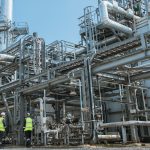
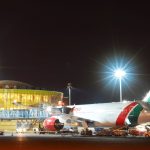

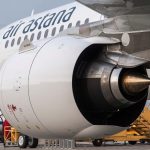

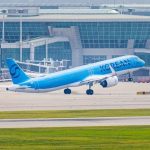



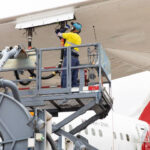



More News & Features
UK government starts new consultation on SAF revenue certainty mechanism
African Development Bank and Japanese industrialist unite to explore SAF production in Africa
LanzaJet and KMG agree to progress SAF production project in Kazakhstan
SkyNRG says e-SAF and carbon removals should not be competing strategies for aviation decarbonisation
South Korea announces mandatory SAF blending for departing international flights from 2027
Catagen launches SAF production company and signs offtakes with Ryanair and Shell